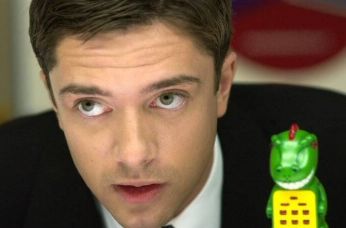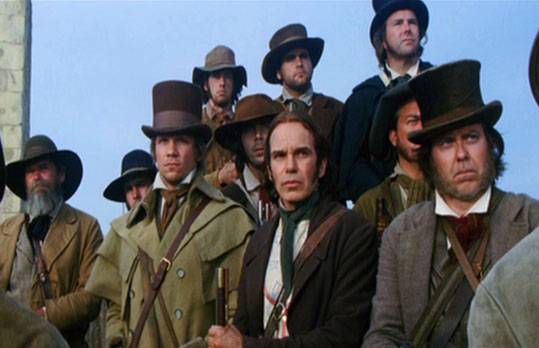 Contrary to his admission in Ocean’s 12, I’m happy to report that Topher Grace did not in fact “phone in that Dennis Quaid movie.” In fact, he, Quaid, and much of the supporting cast make In Good Company a sometimes saccharine but ultimately worthwhile evening at the movies. Like Phillip Seymour Hoffman and Todd Louiso, Grace is great at bringing to life characters that we all know in real life but rarely see onscreen, and his turn here as aspiring but well-meaning corporate shark Carter Duryea is no exception. And Quaid, who’s slowly taken on a rugged, masculine resonance in his middle-aged period — sorta like Harrison Ford 6-8 years ago — is equally good as displaced and disgruntled ad sales exec Dan Foreman (probably one of the most goofily symbolic character names since Tom Hanks’ “Chuck Noland” in Cast Away.)
Contrary to his admission in Ocean’s 12, I’m happy to report that Topher Grace did not in fact “phone in that Dennis Quaid movie.” In fact, he, Quaid, and much of the supporting cast make In Good Company a sometimes saccharine but ultimately worthwhile evening at the movies. Like Phillip Seymour Hoffman and Todd Louiso, Grace is great at bringing to life characters that we all know in real life but rarely see onscreen, and his turn here as aspiring but well-meaning corporate shark Carter Duryea is no exception. And Quaid, who’s slowly taken on a rugged, masculine resonance in his middle-aged period — sorta like Harrison Ford 6-8 years ago — is equally good as displaced and disgruntled ad sales exec Dan Foreman (probably one of the most goofily symbolic character names since Tom Hanks’ “Chuck Noland” in Cast Away.)
In fact, that “Foreman” gimmick is probably the main problem with In Good Company. It’s painted in broad strokes, and at times, the scriptwriting wheels grind so loudly in this so-warmhearted-its-dopey flick that it took me right out of the film. Quaid’s Foreman doesn’t just love his job — he loves his job, with an intensity and naivete that’s, if not unbecoming, at least unrealistic in a guy his age. Similarly, Grace’s overcaffeinated, underexperienced Duryea seems to know instinctively he’s trodding the wrong path from the get-go, which kills what little uncertainty we had about where the story is going. The one real bad guy (Clark Gregg) is really bad, Duryea’s self-absorbed trophy wife (Selma Blair) is really self-absorbed (their foyer is a shrine to her image), and so on. (Scarlett Johansson, rounding out the top bill as Quaid’s daughter and Grace’s post-Blair love interest, is at turns girlish and womanly as the script necessitates…and I didn’t find her believable at all. Then again, I’ll admit, Lost in Translation notwithstanding, I’m starting to find Johansson as annoyingly mannered as Jeremy Davies on his bad days.)
 To be fair to In Good Company, my taste in corporate satire runs closer to Brazil, Office Space, The Office, Glengarry Glen Ross, and In the Company of Men than it does to films like this one, which I think almost undoubtedly speaks worse of me than it does this movie. As he also showed in the surprisingly moving About a Boy, writer-director Paul Weitz is magnanimous to a fault with his characters — at times, he doesn’t seem to want to think badly of any of them. And, particularly with Grace, Quaid, and role players like David Paymer working their mojo, In Good Company‘s kindness is contagious — Annoyed by the sugary-sweetness of it all at first, I found myself slowly and inexorably won over by the movie in the middle hour. By the time Quaid speaks truth to power (in the form of Malcolm McDowell’s Murdoch-like Teddy K) in the final act, I knew the movie was selling me a seriously implausible view of just desserts and the corporate life. But, ultimately, I didn’t mind so much.
To be fair to In Good Company, my taste in corporate satire runs closer to Brazil, Office Space, The Office, Glengarry Glen Ross, and In the Company of Men than it does to films like this one, which I think almost undoubtedly speaks worse of me than it does this movie. As he also showed in the surprisingly moving About a Boy, writer-director Paul Weitz is magnanimous to a fault with his characters — at times, he doesn’t seem to want to think badly of any of them. And, particularly with Grace, Quaid, and role players like David Paymer working their mojo, In Good Company‘s kindness is contagious — Annoyed by the sugary-sweetness of it all at first, I found myself slowly and inexorably won over by the movie in the middle hour. By the time Quaid speaks truth to power (in the form of Malcolm McDowell’s Murdoch-like Teddy K) in the final act, I knew the movie was selling me a seriously implausible view of just desserts and the corporate life. But, ultimately, I didn’t mind so much.
Just as the film condemns globalization and “synergy” while throwing in more gratuitous product placements per minute than I’ve seen in some time, In Good Company nevertheless eventually won me over with its generosity of spirit. As Barnum said, there’s a sucker born every minute, and by the end, I was another satisfied customer.


